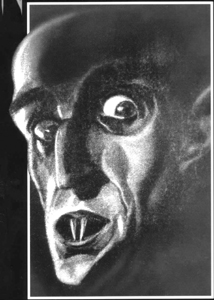![[Metroactive Movies]](/movies/gifs/movies468.gif)
[ Movies Index | Show Times | Santa Cruz Week | SantaCruz Home | Archives ]

Fangs for Everything: Max Schreck's portrayal of 'Count Orlok'--a thinly disguised version of Bram Stoker's Dracula--is still impossibly inhuman enough to surprise modern audiences. A Symphony of Horror New music hero Phil Collins looks to restore some dignity to the much-abused 'Nosferatu' with a new score for its Rio screening By Steve Palopoli Ever had the feeling there was something seriously wrong with music in the movies but not been able to put your finger on it? Well, New Music Works director Phil Collins can put his finger on it. "Kevin Costner needs to be whipped," says Collins. "He's the guy with all the worst [film scores]. I remember seeing the preview for Dances With Wolves, and I never saw the film, because I was so pissed that he's having Native Americans riding around with symphonic orchestras playing Aaron Copland." The famously good-natured Collins isn't mincing words these days--but then, where would he find the time? Especially after taking on the enormous task of writing a new score for F.W. Murnau's classic but controversial 1922 silent film Nosferatu: A Symphony of Horror--all 61 minutes of it. Oh, wait, make that 81 minutes of it. Or is it 84? Will the real Nosferatu please stand up? "I have four DVDs, and they're all different. It's gotten very frustrating," says Collins. "I worked last summer with a VHS from the library that was 61 minutes. Then I got introduced to another version that was 84 minutes. And then one that the Silent Orchestra is pushing very hard that is 81 minutes." Ah, therein lies the slippery slope that is Nosferatu. The reason there are so many different versions of the film is that this first big-screen version of Bram Stoker's Dracula didn't go so far as to be the first authorized version of the legendary book. And Stoker's widow was not at all stoked when she found out that screenwriter Henrik Galeen had borrowed the plot of her late husband's novel--apparently, no one was fooled by the fact that the story had been moved to Germany and the main vampire's name had been changed to "Count Orlok." Her subsequent lawsuit forced the trashing of every negative and print of the film known to exist. However, one print from the original German release did survive, along with a handful of other early versions (mostly from re-releases) in other countries. Since then, so many different sketchy versions have been released it gets a little hard to tell if you've actually seen Nosferatu the way it was meant to be seen. But Collins was stuck between Orlok and a hard place when he learned that for his new score's live-accompaniment debut on Oct. 25, the Rio Theatre had tracked down a restored version of the film that was over an hour-and-a-half long. It was the best print by far that Collins had seen, but it also meant adding half an hour more music than he'd done for his original hour-long endeavor. "It's an outstanding visual restoration," says Collins of the print the Rio will be showing. "It's enormous. I was hoping we could resort to one of the ones I'd worked with already, but when I saw the resolution of this, I felt that it would be a complete mistake on the big screen to not take advantage of this really fine one. The new one has footage in it that none of the others have." As for existing Nosferatu music, Collins has heard nearly as many different versions of the score as he's seen of the film. And let's just say there's a reason he's doing another one. "I've heard three different versions now, and they've all been too random, too reactionary to specific images without any kind of long-term arch, and thus they shoot their wad on all these high-tempo, excruciating dissonant things in the first couple minutes, and you have nowhere to grow from," says Collins. He himself is banking on an entirely different strategy, one that emphasizes mood, motif and context rather than visceral hard-sell. "I feel more like a painter than usual, because most of my solutions for this have come from watching scenes a few times, then going away from it and just tinting things. Almost anything is too much, because the directing is so subtle, the humor is so subtle, that music's attempts at irony in the traditional silent-accompaniment approach keep undermining it."
Nosferatu: A Symphony of Horror will be screened Oct. 25 at 8pm at the Rio Theater 1205 Soquel Ave., Santa Cruz, with live accompaniment by the New Music Works Ensemble Players debuting a new score by Phil Collins. Tickets are $9 advance, $13 day of show at the door, available at Streetlight Records and the Santa Cruz Civic. [ Santa Cruz Week | Metroactive Central | Archives ]
|
From the October 22-29, 2003 issue of Metro Santa Cruz.
Copyright © Metro Publishing Inc. Maintained by Boulevards New Media.
For more information about Santa Cruz, visit santacruz.com.